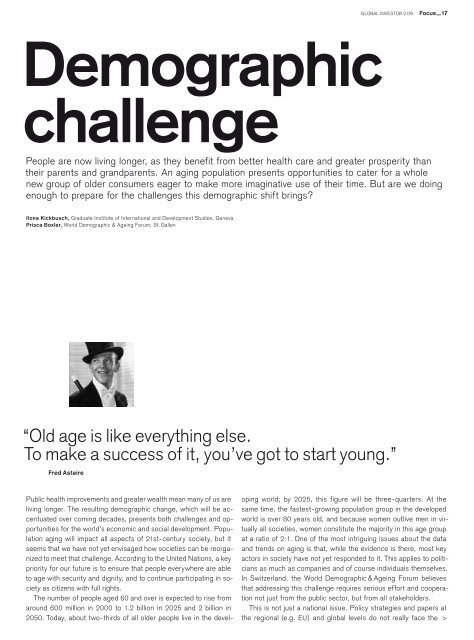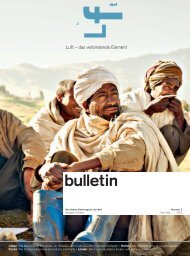Global Megatrends
Prepare yourself for the future Global Investor, 02/2009 Credit Suisse
Prepare yourself for the future
Global Investor, 02/2009
Credit Suisse
Create successful ePaper yourself
Turn your PDF publications into a flip-book with our unique Google optimized e-Paper software.
GLOBAL INVESTOR 2.09 Focus — 17<br />
Demographic<br />
challenge<br />
People are now living longer, as they benefit from better health care and greater prosperity than<br />
their parents and grandparents. An aging population presents opportunities to cater for a whole<br />
new group of older consumers eager to make more imaginative use of their time. But are we doing<br />
enough to prepare for the challenges this demographic shift brings?<br />
Ilona Kickbusch, Graduate Institute of International and Development Studies, Geneva<br />
Prisca Boxler, World Demographic & Ageing Forum, St. Gallen<br />
“Old age is like everything else.<br />
To make a success of it, you’ve got to start young.”<br />
Fred Astaire<br />
Public health improvements and greater wealth mean many of us are<br />
living longer. The resulting demographic change, which will be accentuated<br />
over coming decades, presents both challenges and opportunities<br />
for the world’s economic and social development. Population<br />
aging will impact all aspects of 21st-century society, but it<br />
seems that we have not yet envisaged how societies can be reorganized<br />
to meet that challenge. According to the United Nations, a key<br />
priority for our future is to ensure that people everywhere are able<br />
to age with security and dignity, and to continue participating in society<br />
as citizens with full rights.<br />
The number of people aged 60 and over is expected to rise from<br />
around 600 million in 2000 to 1.2 billion in 2025 and 2 billion in<br />
2050. Today, about two-thirds of all older people live in the devel-<br />
oping world; by 2025, this figure will be three-quarters. At the<br />
same time, the fastest-growing population group in the developed<br />
world is over 80 years old, and because women outlive men in virtually<br />
all societies, women constitute the majority in this age group<br />
at a ratio of 2:1. One of the most intriguing issues about the data<br />
and trends on aging is that, while the evidence is there, most key<br />
actors in society have not yet responded to it. This applies to politicians<br />
as much as companies and of course individuals themselves.<br />
In Switzerland, the World Demographic & Ageing Forum believes<br />
that addressing this challenge requires serious effort and cooperation<br />
not just from the public sector, but from all stakeholders.<br />
This is not just a national issue. Policy strategies and papers at<br />
the regional (e.g. EU) and global levels do not really face the >

















